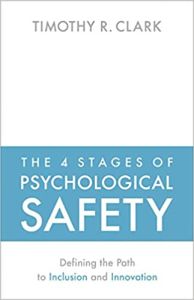Research reveals that money can’t compensate for a lack of psychological safety in the workplace – that is, a sense of belonging, and freedom to speak up, learn, and contribute. Your organization gains a competitive advantage when your employees feel comfortable enough to create and innovate. Leadership consultant Timothy Clark outlines four stages through which your company must progress to become inclusive and visionary – inspiring your employees to do their best work.
Psychological safety enhances team performance and your organization’s ability to remain competitive. It can be achieved in four stages.
To stay relevant in today’s economy, companies need to maintain their competitive advantage. Organizational leaders must promote a forward-thinking culture, one that inspires collaboration and innovation. They must learn how to remove the psychological barriers that inhibit their teams’ performance. Companies must create an environment where workers feel safe to take initiative and create solutions.
Effective leaders understand they must encourage connection and collaboration to spur innovation. Team members must feel respected and have permission to think and grow. Innovation relies on intellectual friction – which occurs when team members can question the status quo, scrutinize existing systems, and develop new, more efficient processes. At the same time, social friction that inhibits collaborative efforts or breeds fear of retribution must be minimized.
Humans require food and shelter to live healthy lives; beyond these basic needs, however, people have a drive to fulfill their psychological...
Timothy R. Clark is the founder and CEO of LeaderFactor, a global leadership consulting, training and assessment organization. He is the author of five books and the developer of the EQometer™ emotional intelligence assessment.


































Comment on this summary